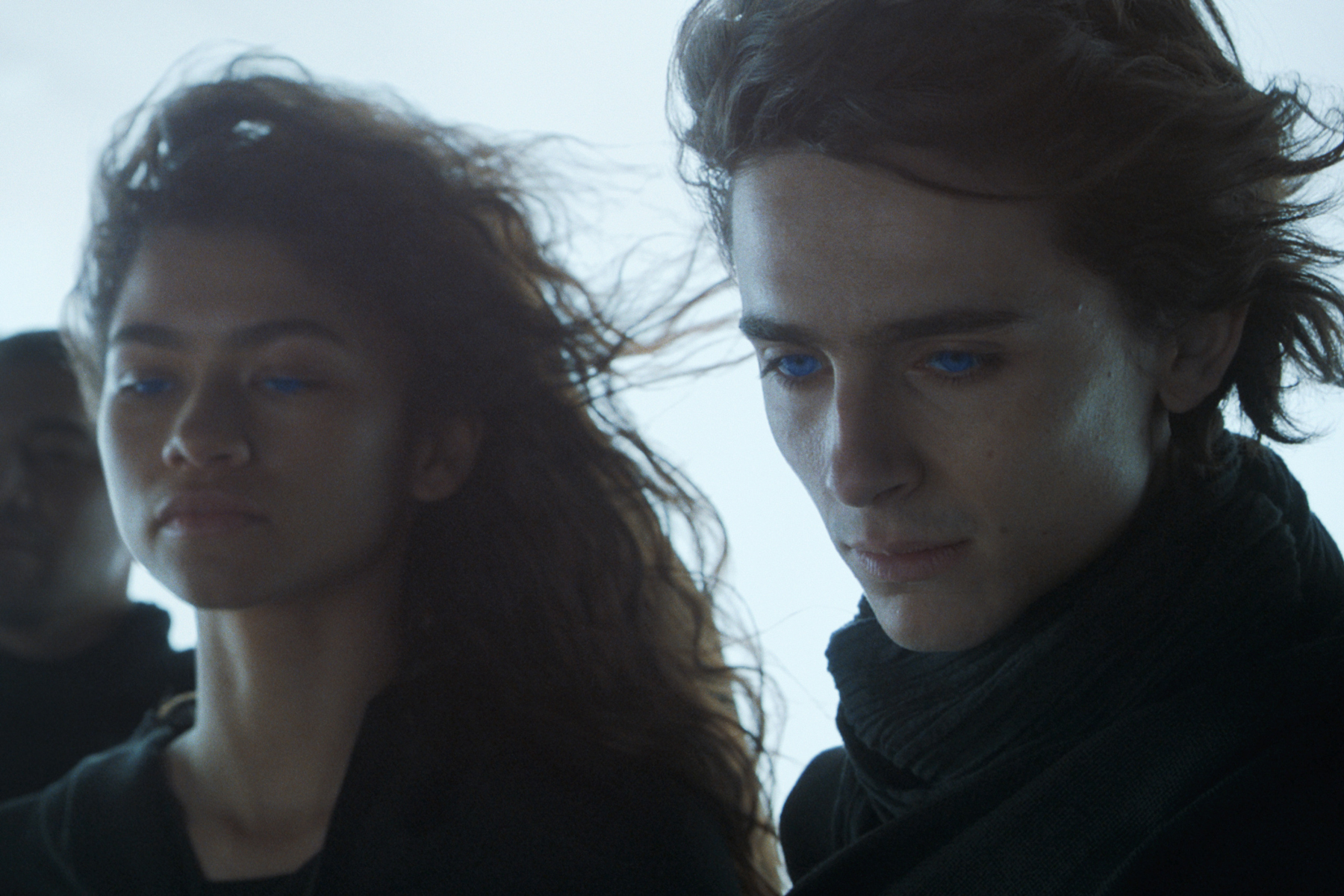*This review is SPOILER FREE*
Living up to one’s destiny and legacy is hardly ever easy. That is continuously seen throughout Warner Bros. and Legendary Picture’s latest film in Dune. Based on Frank Herbert’s novel of the same name, this movie tells the tale of civilization in 10191, focusing on House Atreides, a loyal family that dates back its ancestry to the Ancient Greeks.
The family’s child, Paul Atreides (Timothée Chalamet), has been training to be the next patriarch of this great House and embrace his destiny as his father and grandfather did before him.
From the opening scene of Dune, there was a lot of exposition thrown at the audience, with Zendaya’s Chani narrating about the desert planet Arrakis and the valuable resource of the spice found throughout the planet. This exposition style can fit the movie like in A Christmas Story (1983), but it can also take away from a movie like it did in The Great Gatsby(2013). Due to this movie only using narration early in the film, it did not take too much away from the film. However, the expository context shared through Chani’s narration was transferred a couple of times again in the movie, making this opening scene redundant and pointless.


PHOTO BY CHIABELLA JAMES
Although he has his whole life practically outlined for him already, Paul does not know if that is the direction he wants to go or if he will succeed if he does follow in his Duke father’s footsteps. The way Chalamet presented Paul Atreides dealing with his father and elders was brilliant with his eyes hardly making eye contact, shoulders down, and the low tone of his voice. This change of mood and persona when he was with his longtime friend Duncan Idaho (Jason Momoa) only heightens the person he is when with his father and the council.
As expected, if you have ever seen a movie or read a book before, this protagonist was thrust into life experiences that were not planned or could be trained for. Once this happened, Paul’s demeanor slowly began to change, and his body language showed that by standing just a little taller and mimicking his trusted and gallant father.
My favorite dynamic in the entire film came from Duke Leto Atreides (Oscar Isaac) and his concubine and Paul’s mother in Lady Jessica (Rebecca Ferguson). These two have raised Paul in their respective ways and have so far succeeded in their unique parenting styles. There is some softness and passion within this couple’s relationship, but audiences can tell that they are not sharing everything with the other. Although these two and their complex bond are not the main focal point of the movie, the scenes they share express so much about the other and why Paul is the young man he is.
Duke Leto and Lady Jessica also are also personified examples of the two beliefs of what you can see versus what you are unable to see. Leto is a military general while Lady Jessica is an acolyte of the Bene Gesserit, an all-female group that has physical and mental abilities. Even though Leto believes in his Jessica’s and the Bene Gesserit’s power, the Duke of House of Atreides clearly does not like relying on these mystical powers when armies and weapons are at his disposal. Leto makes this indirectly clear when he wants to focus on maintaining his powerful air and water armies while developing desert power on Arrakis. Lady Jessica has no care for the military aspects of the ruling but makes sure her son follows in her ways within the Bene Gesserit.
Within this film, multiple themes were examined, and they were all done to varying success. While the religious tones around Paul, often referred to as a “messiah,” the best one was the dynamic between the Freman, Arrakis’ native population, and those who came with House Atreides. These differing peoples are telling the tale of colonizers and colonized. Every member of the Freman was black or people of color, while those from Caladan and House Atreides were white or white-passing. The first interaction with the leader of a local Freman in Stilgar (Javier Bardem), and Duke Leto is the closest thing to explicitly depicting this theme. House Atreides is not the first “outworlders” to arrive on Arrakis, so Stilgar appreciates a meeting with them but expects nothing from them just as long as they leave them alone.

The visuals of this were most outstanding. The large-scale planets were beautifully created in this world and they conveyed jaw-dropping awe with every new scene. One moment fell flat when a harvester was being brought into the desert by a carryall vehicle. The suitcase used some balloon technology to fly the large harvester over the city’s boundary. These balloons did look a little tacky and blatantly computer-generated. That being said, if this minor and quick scene is the only issue with visuals, that sounds like a significant success in the graphics department.
As alluded to during the promo of this movie but never explicitly marketed, the opening title at the top of the film did say Dune: Part One. It is unsure if this is Denis Villeneuve playing proverbial chicken with Warner Bros., but the movie was definitely curated to be followed up with a sequel. That being said, this film did flow from exciting and intense scenes with relaxing moments very well while never dragging in one tempo for too long. If you have not seen this movie, then it can be your next movie night.
Watch Dune in theaters now or on HBO Max!



